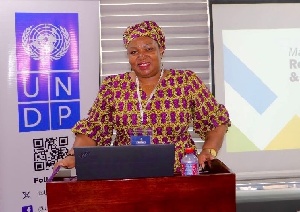- Home - News
- Elections 2024
- News Archive
- Crime & Punishment
- Politics
- Regional
- Editorial
- Health
- Ghanaians Abroad
- Tabloid
- Africa
- Religion
- Photo Archives
- Press Release
General News of Wednesday, 21 May 2025
Source: www.ghanawebbers.com
May floods expose urgent need to activate Ghana’s urban flood insurance scheme
The floods that hit Accra on May 18 have renewed calls for action. Ghana needs to implement a parametric flood insurance scheme. This scheme is designed to protect urban areas like the capital.
After hours of heavy rain, major roads turned into rivers. Homes were flooded, and hundreds of families were displaced. The aftermath included stranded commuters, flooded schools, and destroyed livelihoods. This situation is familiar for a city that often faces flooding.
Experts believe this disaster could have been less damaging. They say Ghana could have activated a flood insurance mechanism ready for use. This scheme has been in development since 2022 with various partners, including the UNDP.
The parametric insurance model triggers payouts automatically during severe weather events. It does not require post-disaster damage assessments. Emergency funds would be released within 7 to 10 days for immediate relief efforts.
Dr. Amina Sammo from UNDP Ghana stated, “This is not just a concept; it’s ready to deploy.” She noted that emergency funds could have helped displaced families quickly. These funds could support shelter, food, and repairs to infrastructure.
A contingency plan by NADMO aligns with the insurance model for quick resource deployment during crises. Additionally, the Insurance Resilience Solutions Fund has pledged up to USD 2 million in premium support over three years.
Despite these promising developments, the scheme remains inactive. UNDP Ghana urges key stakeholders to take swift action now. They should accept ISF premium support and sign implementation agreements.
Stakeholders must also integrate the insurance mechanism into disaster response plans at all levels. Using Accra as a pilot can help scale this model to other flood-prone cities like Kumasi and Tamale.
Raising public awareness about insurance as essential for disaster risk financing is crucial too. Ghana has faced severe floods before, notably in June 2015 when over 150 lives were lost.
Yet the country still relies on reactive disaster management instead of proactive measures. Dr. Sammo emphasized that “the May 2025 floods should be the turning point.”
She added that rebuilding after every storm is unsustainable; protection must come first before future storms hit.
With climate change increasing extreme weather events' frequency and severity, urban centers are more vulnerable than ever. The tools for effective response already exist; what’s needed now is political will and coordinated action.
Let May 2025 be remembered as the moment Ghana shifted from planning to protection.











